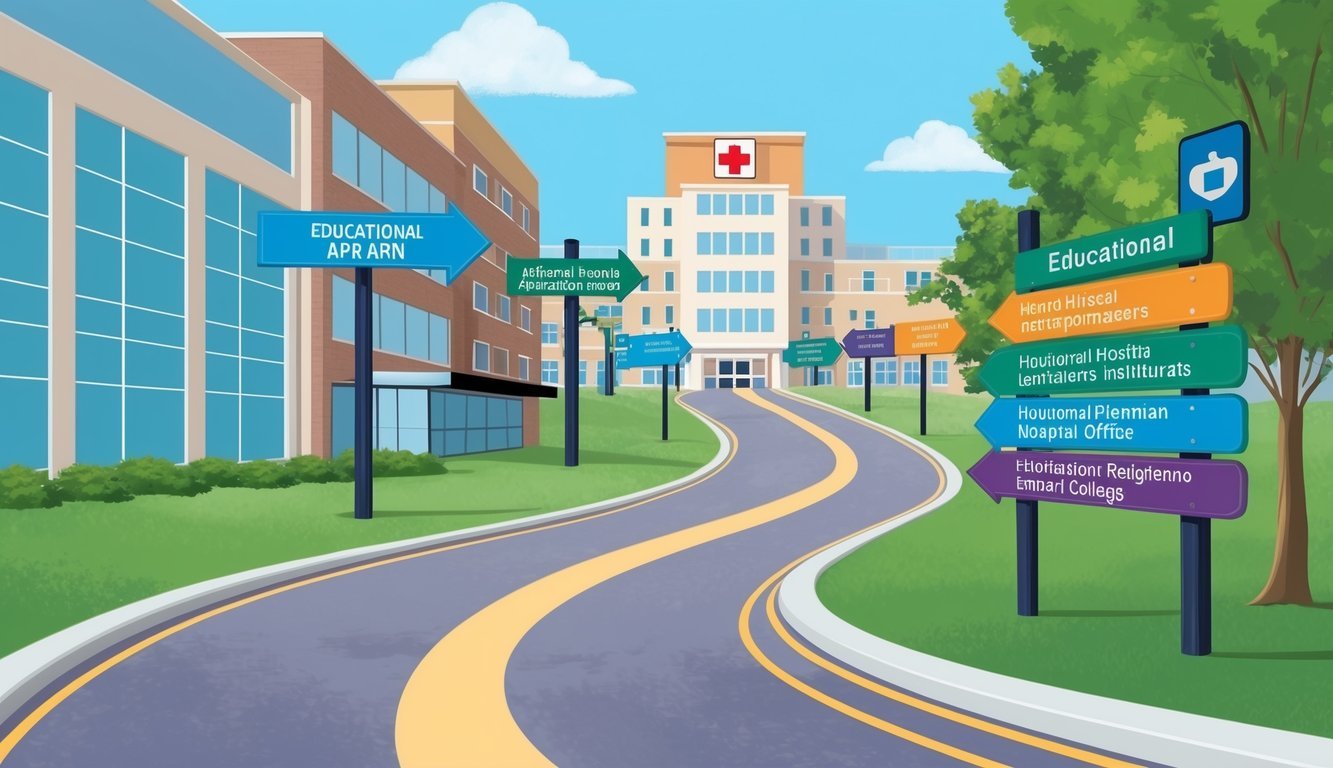Becoming an Advanced Practice Registered Nurse (APRN) opens doors to a rewarding and specialized career in nursing.
First, you must achieve a Bachelor of Science in Nursing (BSN).
Then, you need to obtain a Master’s or Doctoral degree in nursing.
This advanced education not only enhances your clinical skills but also prepares you for roles in primary, acute, and specialty care.
The APRN path includes various specializations, such as Nurse Practitioners, Clinical Nurse Specialists, Certified Nurse Midwives, and Certified Registered Nurse Anesthetists.
Each specialty allows you to focus on areas that interest you while delivering high-quality care to patients.
As you navigate this career progression, you’ll engage in both theoretical learning and practical experience, which are essential components of your education.
With the healthcare landscape continually evolving, the demand for APRNs is growing, making this an opportune time to enter the field.
By understanding the steps to become an APRN and recognizing the diverse career opportunities available, you can confidently pursue this advanced nursing career.
Explore resources like NurseJournal or NursingWorld to guide you through each stage of the process.
Educational Pathways to APRN

To become an Advanced Practice Registered Nurse (APRN), you must follow a structured educational pathway that includes undergraduate nursing education, advanced graduate nursing programs, and specialization options.
Each step builds on the previous one to prepare you for the diverse roles available in advanced nursing practice.
Undergraduate Nursing Education
Your journey begins with earning a nursing degree, typically a Bachelor of Science in Nursing (BSN) or an Associate Degree in Nursing (ADN).
- BSN: A four-year program that provides a comprehensive education in nursing practices, leadership, and critical thinking.
- ADN: A two-year program focused on the essential nursing skills needed for entry-level practice.
Graduating from an accredited program is crucial as it impacts your eligibility for the NCLEX-RN examination.
Once you pass this exam, you’ll become a Registered Nurse (RN), which is a prerequisite for advancing to APRN programs.
Graduate Nursing Programs
After becoming an RN, you can pursue advanced education through a Master of Science in Nursing (MSN) or a Doctor of Nursing Practice (DNP).
- MSN: Generally two years in length, it prepares you for various APRN roles, such as Nurse Practitioner (NP) or Clinical Nurse Specialist.
- DNP: A more extensive program that emphasizes clinical expertise and evidence-based practice. This pathway is ideal if you aspire to take on leadership roles.
Many institutions offer online nursing degree options, making it convenient to continue your education while working.
Choosing a Specialization
Selecting a specialization allows you to focus on a specific area of healthcare.
The following are common APRN specialties:
- Family Nurse Practitioner (FNP): Provides primary care to individuals across the lifespan.
- Pediatric Nurse Practitioner (PNP): Focuses on health care for infants, children, and adolescents.
- Neonatal Nurse Practitioner (NNP): Cares for newborns, especially those who are ill or premature.
- Adult/Gerontology Nurse Practitioner: Addresses the healthcare needs of adults, including the elderly.
- Psychiatric Nurse Practitioner: Specializes in mental health care.
Consider your interests and career goals when selecting a specialty, as this decision shapes your future practice and patient interactions.
Licensure and Certification
To practice as an Advanced Practice Registered Nurse (APRN), obtaining the necessary licensure and certification is essential.
This involves passing the NCLEX-RN examination to become a registered nurse and then pursuing advanced practice certifications that align with your chosen specialty.
NCLEX-RN and RN Licensure
The first step in becoming an APRN is obtaining your Registered Nurse (RN) licensure through the National Council Licensure Examination (NCLEX-RN).
This exam tests your knowledge and readiness to deliver safe and effective nursing care.
- Eligibility: You must complete an accredited nursing program.
- Application Process: Submit your application to your state nursing board and register for the NCLEX-RN.
- Exam Structure: The exam consists of multiple-choice questions that assess clinical judgment and knowledge critical to nursing practice.
Passing the NCLEX-RN is a prerequisite for practicing as an RN, and it is your gateway to advanced education in nursing.
Advanced Practice Certifications
Once you have secured your RN licensure, the next step is to pursue advanced practice certifications relevant to your field.
These certifications may include:
- Family Nurse Practitioner (FNP)
- Adult-Gerontology Nurse Practitioner (AGNP)
- Psychiatric Mental Health Nurse Practitioner (PMHNP)
- Clinical Nurse Specialist (CNS)
Certification is typically administered by organizations such as the American Nurses Credentialing Center (ANCC).
The certification process involves:
- Completing an accredited graduate program in your chosen specialty.
- Undergoing clinical experience that meets certification requirements.
- Passing a national certification exam for your specialty, which assesses your competency and knowledge.
State Licensure for APRN Roles
After obtaining advanced practice certification, you will need to secure state licensure specific to your APRN role.
This involves applying to your state’s nursing board and providing proof of your certification and clinical experience.
Some key points include:
- Prescriptive Authority: Many states offer prescriptive authority for APRNs, allowing them to prescribe medications within their scope of practice.
- State Regulations: Each state has unique regulations that may govern scope of practice, continuing education requirements, and renewal processes for APRNs.
It’s essential to stay updated on your state’s rules and requirements to maintain your licensure and practice legally.
Clinical Training and Advanced Skills

Effective clinical training is paramount in developing the advanced skills necessary for your role as an Advanced Practice Registered Nurse (APRN).
It ensures you can provide comprehensive healthcare services, including diagnosing and treating illnesses, prescribing medication, and engaging in disease prevention strategies.
Practicum and Residencies
During your APRN education, you will complete a practicum or residency that includes hands-on experience in a clinical setting.
This is essential for applying theoretical knowledge to real-world situations.
Typically, you will work under the supervision of experienced healthcare providers, which allows you to hone your skills in patient care and develop critical thinking abilities.
This experience often covers various specialties, such as working alongside a Nurse Anesthetist (CRNA) or a Nurse Midwife.
A practicum might include:
- Timing: Varies by program but usually lasts several months.
- Location: Can occur in hospitals, clinics, or community health organizations.
- Focus Areas: May involve a mix of primary care, urgent care, and specialty settings.
Through this experience, you’ll learn to effectively assess and manage patient conditions.
Developing Specialized Clinical Skills
As you progress in your career, you will need to develop advanced clinical skills tailored to your area of specialization, such as becoming a Clinical Nurse Specialist (CNS) or a Nurse Midwife.
Your skill development may include:
- Diagnosing Illnesses: Learn to evaluate patient symptoms and make informed decisions.
- Treating Illnesses: Gain hands-on practice with treatment protocols and patient management.
- Prescribing Medication: Understand pharmacology to safely prescribe and manage medications.
Engaging in continued education and certification programs will enhance your proficiency.
Many APRNs also participate in workshops and seminars to stay current with the latest healthcare trends and practices.
This ongoing learning is key to providing high-quality care and improving patient outcomes.
For further guidance on specialized training, consider exploring opportunities at NursingWorld.
Career Advancement and Opportunities
As an Advanced Practice Registered Nurse (APRN), you have various pathways for career advancement and opportunities in the healthcare field.
Understanding the job market, engaging in continued education, and exploring leadership roles are crucial to your development and success.
Job Market and Salary Expectations
The job market for APRNs is robust, with projected job growth of 45% from 2020 to 2030, according to the Bureau of Labor Statistics.
This growth is attributed to the increasing need for healthcare services, particularly in primary care and health promotion.
| Specialty | Average Salary |
|---|---|
| Nurse Anesthetists | $202,470 |
| Nurse Practitioners | $118,040 |
| Median for All APRNs | $117,670 |
APRNs enjoy significant job security due to this high demand.
Opportunities exist in various settings, including hospitals, private practice, and urgent care centers.
As you advance in your specialization, salaries typically increase, reflecting your skills and expertise.
Continuing Education and Professional Development
Pursuing continuing education is essential for APRNs.
Not only does it enhance your clinical skills, but it also prepares you for higher roles in nursing leadership and specialized areas.
Maintaining certifications and completing courses related to health promotion can boost your qualifications.
This ongoing education can be achieved through:
- Workshops and Seminars
- Online Courses
- Advanced Certifications
Engaging in continuous professional development is vital for staying updated with the latest practices in healthcare.
It helps you remain competitive in the job market and align with industry standards.
Transitioning to Leadership Roles
Transitioning into leadership roles as an APRN opens doors to greater influence in healthcare policy and patient care management.
Leadership positions often require additional skills and emotional intelligence.
In these roles, you may manage teams, develop policies, and oversee patient care quality.
The skills needed include:
- Team Management
- Strategic Planning
- Communication
Involvement in nursing leadership can lead to positions in academia or health care administration.
Your expertise will be invaluable in guiding future healthcare initiatives and improving patient outcomes, reinforcing your stature in the nursing community.
The Role of APRNs in Healthcare Systems

Advanced Practice Registered Nurses (APRNs) play a vital role in the healthcare system by providing high-quality care across various specializations.
They help meet diverse patient needs in both primary and acute care settings while also contributing to innovation and policy development in healthcare.
Delivering Primary and Acute Care
APRNs function as primary care providers, focusing on both preventive and acute care services.
They assess, diagnose, and treat various health issues, including chronic conditions, directly impacting patient outcomes.
In primary care, APRNs often manage routine health checks, immunizations, and chronic disease management.
In acute care settings, they play critical roles in hospitals and clinics, providing immediate care for patients experiencing significant health issues.
Their advanced training allows them to perform procedures, prescribe medications, and interpret diagnostic tests, ensuring comprehensive patient management.
This ability contributes to more efficient healthcare delivery, as they often serve as first points of contact.
Specialized Practices in Healthcare
APRNs can specialize in fields such as neonatal care, women’s health, oncology, cardiology, and pediatrics.
Each specialization allows you to address specific health needs within different populations effectively.
For example, neonatal nurse practitioners focus on high-risk newborns, while women’s health APRNs concentrate on maternal care and reproductive health.
Their expertise in these areas enables APRNs to fill critical gaps in healthcare services.
By providing specialized care, they enhance treatment options available to patients, promote preventive care, and support advanced therapeutic interventions.
Contributions to Healthcare Innovation
APRNs also contribute to healthcare innovation by participating in policy development and quality improvement initiatives.
Their hands-on experience gives them unique insights into patient care challenges, enabling them to advocate for necessary changes to healthcare systems.
Their full practice authority allows APRNs to operate independently in many states, addressing provider shortages and increasing access to care.
Additionally, they excel in patient education and have strong communication skills.
This ensures patients understand their health conditions and treatment plans, promoting better health literacy and enhanced patient engagement in their healthcare journey.

